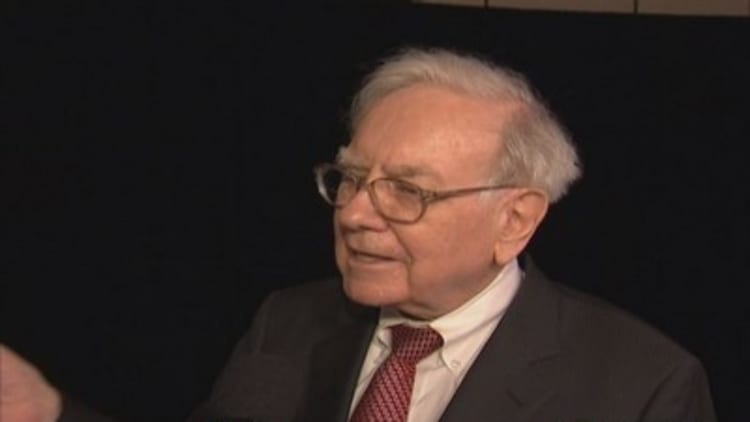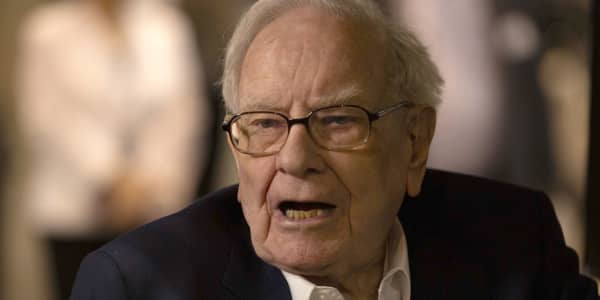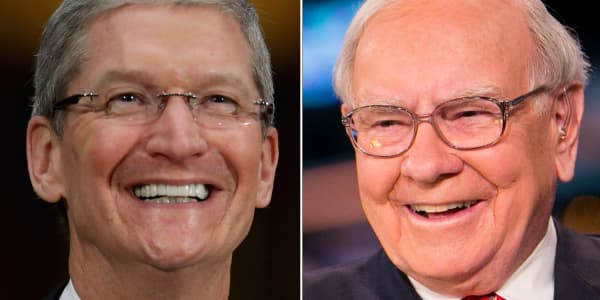
Warren Buffett said he's not surprised that some CEOs are overreaching.
Asked about his comment during Saturday's Berkshire Hathaway shareholders meeting that some chief executives are "operating outside of their circles of competencies," Buffett said, "It's very human when you're at the top of an organization to start thinking you have more powers than you do. And I'm probably guilty of that myself."
He wouldn't, however, name any other names.
Buffett also told CNBC's Becky Quick after a 5-hour Q&A session before roughly 38,000 shareholders, that while some companies look for "Cocker Spaniels" with "wagging tails" and not "Dobermans" when selecting board compensation committee members, that's not the case with his company.
Read MoreBuffett defends Coke vote, wants secret CEO salaries
"We're looking for ... people who are business oriented, business savvy, that care about Berkshire and they're shareholder oriented. That leaves a lot of people out, but we found a dozen people like that."
Here's their complete "postgame" conversation:
BECKY: Warren, last year when we had this opportunity I read back some quotes from Charlie (Munger)...
BUFFETT: (Laughs.) I remember.
BECKY: ... and asked you to respond. This year you said some doozies of your own so I'd like to repeat some of your comments and followup on them.
BUFFETT: OK.
BECKY: Here goes. On boards, you said, "They do not look for Dobermans. They look for Cocker Spaniels and then they make sure their tails are wagging." Does that include the Berkshire board?
BUFFETT: I was making that specifically—I think I was—in terms of compensation committees. But, no, I think what we're looking for at Berkshire— I know what we're looking for—are people that are business oriented, business savvy, that care about Berkshire and they're shareholder oriented. And that leaves a lot of people out. But we found a dozen people like that.
BECKY: My next question is, you said something today that, "I've seen a lot of CEOs operating outside their circles of competencies." Can you name some?
BUFFETT: (Laughs) I could (laughs) but I won't. But I will tell you it's true. I mean, it's very human when you're at the top of an organization to start thinking you have more powers than you do. And I'm probably guilty of that myself. But I don't think I want to name the ones…
BECKY: You sure?
BUFFETT: I'm pretty sure. I'm pretty sure. Well, I will say this: you get to the top of a corporation in various ways. You may come through sales or engineering. And all of a sudden you're in a different job. It's like you played the piano all the way to Carnegie Hall and then they handed you a violin. Because now you're involved in allocating capital. That's something many CEOs haven't done below, and yet they're expected to do it and some of them think they can do it that aren't really very good at it.
BECKY: Let me ask you another question. You also said today, "If you're issuing stock continually, one way or another you probably have a chain letter model going." Are there some places you've observed that?
BUFFETT: Oh sure. There's waves of that to some extent. But you certainly saw that in the late 60s to an extreme degree. But you'll see it periodically. Any time a company becomes a serial issuer of stock, they don't think much of their stock. And they're using it as an overvalued currency. And almost always something bad comes from that.
BECKY: You also said today that you and Charlie have never gotten into an argument. But you have had disagreements. So I wonder, what's the biggest disagreement you've ever had about how you run Berkshire?
BUFFETT: Well, he's disagreed more with specific purchases I might make, I would say, not in terms of how we run Berkshire. I can't recall anything on that. But certainly I've bought things that he's disagreed with. And I've refrained from buying things when he's disagreed with me, too. Sometimes –
BECKY: What was one that jumps to mind?
BUFFETT: Well, what jumps to mind? (Pause) I'm not thinking of it right now but I can assure you there have been times when I decided to go ahead and then there have been other times when he's actually talked me out of doing something. Quite a few times on that.
BECKY: OK. Thank you very much for your time.
BUFFETT: Thanks, Becky.
—By CNBC's Alex Crippen. Follow him on Twitter: @alexcrippen





